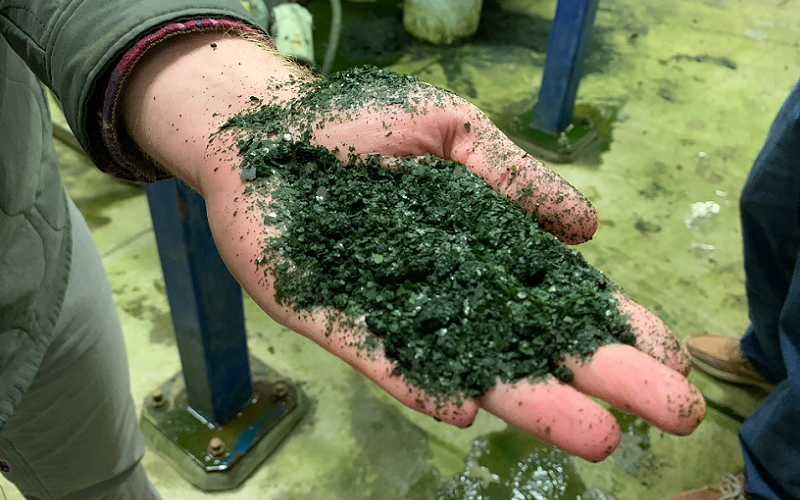
In the vast ocean of nutritional supplements, one group has been steadily gaining recognition for its profound health benefits and sustainable nature — algae-based supplements. Derived from simple, plant-like organisms that thrive in both fresh and saltwater environments, these supplements are more than just a trend in the wellness industry; they represent a bridge between ancient wisdom and modern science. From Spirulina, known for its vibrant blue-green hue and nutrient density, to Chlorella, celebrated for its detoxifying properties, algae-based supplements are a testament to nature’s ingenuity.
Contents
Introduction to Algae-Based Supplements
In recent years, the quest for optimal health and wellness has led many to explore nature’s own treasure trove of nutritional solutions. Among these, algae-based supplements have emerged as a potent source of vital nutrients, capturing the attention of health enthusiasts and researchers alike. These supplements, derived from aquatic organisms that harness the power of photosynthesis, offer a rich blend of vitamins, minerals, and antioxidants.
Definition of Algae-Based Supplements
Algae-based supplements are nutritional products derived from algae, simple organisms that range from single-celled forms to multi-cellular varieties. These supplements come in various forms, including powders, tablets, and capsules, and are lauded for their high concentration of essential nutrients. Unlike typical land-based plants, algae’s unique adaptability allows it to thrive in diverse environments, leading to a nutrient profile that is not only rich but also distinct.
Brief Overview of Algae Types Commonly Used in Supplements
The world of algae is incredibly diverse, but a few types have gained prominence in the supplement industry. Spirulina and Chlorella are the frontrunners, celebrated for their health-promoting properties. Spirulina, a cyanobacterium, is renowned for its protein content and a vast array of vitamins and minerals. Chlorella, a green algae, is highly regarded for its detoxification properties and its ability to bind to heavy metals. Both types offer a unique blend of nutrients, making them a preferred choice for those looking to enhance their nutritional intake naturally.
Importance of Algae in Health and Wellness
The incorporation of algae into the diet is not a new concept. For centuries, various cultures have recognized the nutritional value of algae, utilizing it for its health-promoting properties. Today, as we grapple with the challenges of modern living, such as poor dietary choices and environmental pollutants, the role of algae-based supplements in promoting health and wellness has become more significant than ever. They offer a natural, sustainable solution to nutritional deficiencies and provide support for various bodily functions, marking their undeniable importance in the contemporary health landscape [1].
Historical Context of Algae as a Nutritional Source
Long before algae-based supplements were encapsulated and shelved in modern health food stores, these humble aquatic organisms played a significant role in the diet and culture of various civilizations. The historical use of algae as a nutritional source is rich and varied, reflecting a deep-rooted understanding of its health benefits across different parts of the world.
Traditional Uses of Algae in Various Cultures
Algae’s journey as a nutritional powerhouse began centuries ago, with different cultures incorporating it into their diets and medicinal practices. In Asian cultures, particularly in China and Japan, algae like seaweed have been a dietary staple, appreciated not just for their flavor but also for their health-promoting properties. Sushi, a globally beloved delicacy, is a testament to the traditional use of seaweed in Japanese cuisine. Similarly, in ancient Aztec civilization, Spirulina was harvested from Lake Texcoco and used as a food source, valued for its high protein content and nourishing properties.
Evolution of Algae-Based Supplements in Modern Times
As the world transitioned into the modern age, the traditional knowledge of algae’s health benefits did not fade away. Instead, it found new expressions through scientific research and technological advancements. The 20th century witnessed a renewed interest in algae, not just as a food source but as a concentrated supplement capable of addressing various health concerns of modern living [2].
Spirulina and Chlorella, once obscure names, became synonymous with health and wellness, leading to the proliferation of algae-based supplements in various forms. This evolution was marked by rigorous scientific research aimed at understanding and harnessing the full potential of these aquatic nutrients.

Nutritional Profile of Algae-Based Supplements
Algae-based supplements are not just popular because of their historical significance or their sustainable nature; their rise to prominence is largely attributed to their dense nutritional profile. Packed with a wide array of essential nutrients, these supplements offer a concentrated source of health-promoting components.
Key Nutrients Found in Algae
Algae, in its various forms, is a treasure trove of nutrients, each playing a unique role in supporting bodily functions and promoting health. The following are some of the most notable nutrients that algae-based supplements are rich in:
Vitamins and Minerals
Algae are a rich source of vitamins, including vitamin A, C, E, and a spectrum of B vitamins, including B12, which is particularly noteworthy for those following a plant-based diet. These vitamins play crucial roles in maintaining optimal body function, from supporting the immune system to enhancing skin health. Additionally, algae offer a wealth of essential minerals such as iodine, iron, magnesium, and calcium, contributing to bone health, cognitive function, and overall metabolic balance.
Essential Fatty Acids
Algae, particularly types like Spirulina, are rich in essential fatty acids, including omega-3 and omega-6. These fatty acids are vital for maintaining heart health, reducing inflammation, and supporting brain health. They are termed ‘essential’ because our body cannot produce them on its own, making their presence in algae-based supplements especially beneficial [3].
Antioxidants
One of the most celebrated aspects of algae’s nutritional profile is its high antioxidant content. Antioxidants like beta-carotene, chlorophyll, and phycocyanin not only give algae their distinctive colors but also combat oxidative stress in the body, which is linked to various chronic diseases. These antioxidants provide a natural way to bolster the body’s defense system against free radicals.
Comparison with Other Nutritional Supplements
When compared to other nutritional supplements, algae-based products stand out for their comprehensive nutrient profile and bioavailability. While many supplements contain isolated nutrients, algae offer a broad spectrum of vitamins, minerals, and other beneficial compounds in a form that the body can easily absorb and utilize. This holistic approach to supplementation is in line with the growing preference for natural, whole-food-based sources of nutrition.
Health Benefits of Algae-Based Supplements
The widespread acclaim of algae-based supplements is not just a reflection of their rich nutritional profile but also their multifaceted health benefits. These supplements are not mere nutrient providers; they offer holistic health support, addressing a range of bodily functions and promoting overall well-being.
Immune System Support
Algae-based supplements, with their high concentration of nutrients and antioxidants, play a significant role in bolstering the immune system. The antioxidants present in algae, such as beta-carotene and chlorophyll, help in neutralizing harmful free radicals, reducing oxidative stress, and thereby strengthening the body’s defense mechanisms. Additionally, the vitamins and minerals in algae support various immune functions, ensuring the body is well-equipped to fend off infections and illnesses [4].
Cardiovascular Health
The essential fatty acids, particularly omega-3s found in algae, are highly beneficial for heart health. These fatty acids help in reducing triglyceride levels, lowering blood pressure, and decreasing the risk of artery blockage, thereby minimizing the risk of heart diseases. Moreover, the presence of antioxidants and minerals like magnesium in algae supplements further supports cardiovascular health by promoting healthy blood circulation and heart function.
Weight Management and Metabolism
Incorporating algae-based supplements into the diet can contribute to weight management and improved metabolism. The high protein content in algae, especially in forms like Spirulina, provides a sense of satiety, reducing the tendency to overeat. Furthermore, certain compounds in algae have been shown to influence fat metabolism, assisting in the management of body weight and supporting overall metabolic health.
Skin Health and Anti-Aging Properties
Algae-based supplements are a boon for skin health, thanks to their rich content of vitamins, minerals, and antioxidants. These nutrients contribute to the maintenance of healthy skin by promoting hydration, elasticity, and protection against UV radiation. The antioxidant properties of algae also play a crucial role in combating signs of aging, reducing the appearance of wrinkles and fine lines, and contributing to a youthful, radiant complexion.
Cognitive Function and Mental Health
The nutritional benefits of algae extend to the brain, offering support for cognitive functions and mental well-being. The omega-3 fatty acids in algae are known for their role in brain health, enhancing memory, focus, and overall cognitive performance. Additionally, the antioxidant content in algae helps in protecting neural cells from oxidative stress, supporting long-term brain health and potentially reducing the risk of neurodegenerative diseases.

Algae-Based Supplements in Holistic Health Practices
In the realm of holistic health, the approach to well-being involves harmonizing the body, mind, and spirit, emphasizing the interconnection between diet, lifestyle, and natural therapies. Algae-based supplements, with their multifaceted health benefits and natural origins, align seamlessly with the principles of holistic health.
Role in Detoxification and Cleansing
Holistic health practices often emphasize the importance of detoxification and cleansing to eliminate toxins and promote optimal bodily functions. Algae-based supplements, particularly Chlorella, are renowned for their detoxifying properties. The high chlorophyll content in Chlorella aids in purifying the blood and removing heavy metals and other harmful substances from the body. This natural detoxification process supports liver health, promotes clean blood circulation, and contributes to overall vitality [5].
Integration in Dietary and Lifestyle Changes
Adopting a holistic approach to health involves making mindful dietary and lifestyle choices that nurture the body and mind. Algae-based supplements can be a valuable addition to this regimen, offering a concentrated source of nutrients and complementing a balanced diet. Whether incorporated into smoothies, taken as a supplement with meals, or used as a nutrient booster in various recipes, algae can enhance the nutritional value of everyday foods, supporting the body’s needs and promoting a lifestyle centered around health and well-being.
Synergy with Other Holistic Health Approaches
Algae-based supplements not only offer standalone benefits but also work synergistically with other holistic health practices. For instance, when combined with practices such as yoga, meditation, or aromatherapy, the stress-reducing and cognitive-enhancing properties of algae can contribute to a more profound sense of relaxation and mental clarity. Furthermore, the anti-inflammatory and antioxidant properties of algae complement herbal remedies and natural treatments, amplifying the body’s ability to heal and maintain balance.
References
[1] Is Algae Oil as Good as Fish Oil? Uses, Benefits and Side Effects
[2] Health Benefits of Blue-Green Algae: Prevention of Cardiovascular Disease
[3] Blue-Green Algae
[4] Best food forward: Are algae the future of sustainable nutrition?
[5] Should You Be Taking an Algae Supplement?
